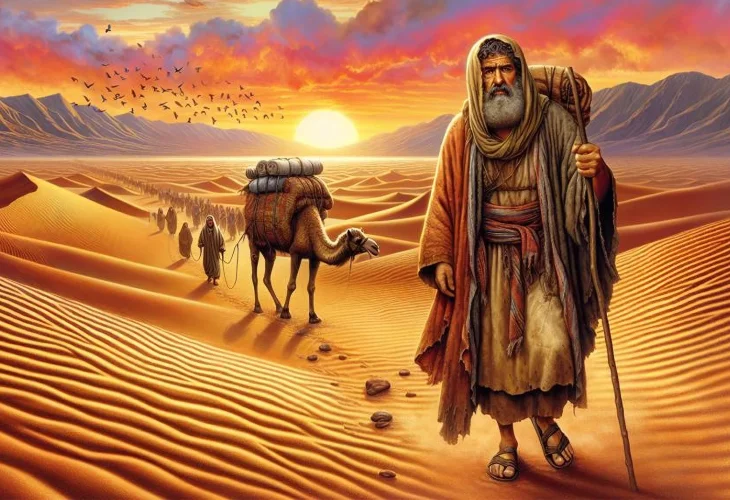The Trials of Abraham: Lessons for the Generations
Every story of the patriarchs holds meaning. Their actions serve as enduring lessons to their descendants, guiding us through generations.
 (Illustration: shutterstock)
(Illustration: shutterstock)While the patriarchs resided in the land of Israel, they encountered three nations: the Canaanites, Egyptians, and Philistines.
This saga holds a lesson for the future generations.
Abraham makes his way to Egypt, confronts Pharaoh, and emerges with great wealth.
The narrative foreshadows his descendants' journey, and the Torah emphasizes this through consistent language. For Abraham, it is stated: "There was a famine in the land, and Abram went down to Egypt to live there for the famine was severe in the land." Similarly, for his descendants: "There was a famine in all the lands... and Joseph was brought down to Egypt... We have come to live in the land, for the famine is severe in the land of Canaan."
Abraham's trial echoes Joseph’s experience. For Abraham: "As Abram entered Egypt, the Egyptians saw that the woman was very beautiful. Pharaoh's officials saw her and praised her to Pharaoh, and the woman was taken into Pharaoh’s house." For Joseph: "The Lord was with Joseph, and he became a successful man... Joseph found favor in his eyes... Joseph was handsome in form and appearance... Pharaoh sent for Joseph and summoned him."
Abraham's ordeal involves the moral corruption of the Egyptians, which he describes: "When the Egyptians see you... they will kill me but let you live... Surely there is no fear of God in this place; they will kill me... " Similarly, for the descendants: "If it is a son, kill him... Let every daughter live," where fear of God also plays a role: "The midwives feared God and let the boys live." Pharaoh blames the victims, asking: "Why have you done this and let the boys live?" as does Abimelech: "What have you done to me that ought not to be done?"
Hashem saves Abraham through plagues: "The Lord struck Pharaoh with great plagues... and Pharaoh ordered men concerning him, and they sent him away with his wife and all he had." Similarly, for his descendants: "Yet another plague I will bring upon Pharaoh and upon Egypt; afterwards, he will let you go."
Hashem shows the nations Abraham’s power of prayer: "Now return the man's wife, for he is a prophet, and he will pray for you, and you shall live. But if you do not restore her, know that you will surely die, you and all that is yours... Abraham prayed to God, and God healed Abimelech." Likewise, for his descendants in Egypt: "Pharaoh said, 'Plead for me'... And the Lord did according to the word of Moses and removed... Take what you have said and go, and bless me also."
When Abraham leaves Egypt, he does so with great wealth and calls on the name of the Lord: "And Abram went up from Egypt, he and his wife and all that he had... And Abram was very rich in livestock, silver, and gold, and he went on his journeys... to the place of the altar, which he had made at first, and Abram called there on the name of the Lord." For his descendants: "They carried away from Egypt utensils of silver and gold... very heavy livestock... The Israelites journeyed... in all their journeys... he told the people all the words of the Lord and built an altar at the base of the mountain."
Abraham teaches us that even if we don’t understand the decrees, Hashem's intentions are for good, as he says: "For your sake, it will be well with me, and my soul shall live because of you." Similarly, Joseph says: "God sent me ahead of you to preserve life for you."
Abraham's encounter with the Canaanites also holds future lessons: Abraham makes Eleazar swear not to take a wife for his son from the Canaanites, a directive for Israel through the ages to avoid mingling with them. The Torah already emphasizes Canaan's curse, destined to be a slave of slaves, a curse continuing for Africans to this day.
Abraham journeys through the land but does not mingle with the Canaanites, does not enter their cities, and does not engage in dealings with them. The sons of Jacob destroy the inhabitants of Shechem, and this serves as a sign for the future: the seven Canaanite nations are to be destroyed; one must not leave them as they will defile Israel with idolatry and corruption.
No part of the patriarchs’ stories was written vainly. All their actions serve as signs for their descendants, guiding them through generations.

